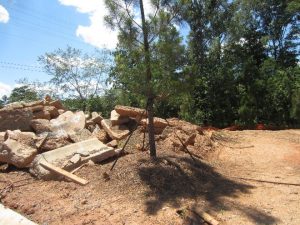By Heather N. Kolich, ANR Agent, UGA Extension Forsyth County
Did you know that many plant problems are directly related to the soil they are planted in? Soil testing is the best way to know if your soil will support healthy growth for your landscape and garden plants. That’s why one of the first questions we’ll ask when making a plant or landscape issue diagnosis is, “Have you done a soil test?”
Soil is the foundation of plant health. Plants draw nutrients and water from soil through their roots. Soil health is often reflected in plant performance. If the soil is low in nutrients, the plant will suffer from nutrient deficiencies that show up in a variety of ways, including poor growth, leaf distortions, and changes in leaf color. Alternatively, the soil may have sufficient nutrients, but the soil pH limits their availability to the plant roots. When soil conditions prevent root growth or nutrient uptake, plants experience stress and may become targets for pests and diseases.
Undisturbed Georgia soils have some good things going for them. Remember the last time you saw our Georgia forests from an airplane? Those 24 million acres of green are proof of healthy soil.
Unfortunately, most of our urban and suburban landscapes are planted in disturbed and damaged soil. The topsoil was likely lost during construction, and the remaining soil may be compacted from the weight of equipment. These issues linger long after construction is completed. Under natural conditions – like in an undisturbed forest – it can take hundreds of years to form one inch of topsoil. And things much lighter than construction equipment cause soil compaction, including lawn mowers, pets, and people, especially when the soil is wet.

Fortunately, many soil problems can be corrected with proper amendments. Soil analysis is the first step to improving your soil. Laboratory testing determines the current pH and nutrient content of your soil sample. University of Georgia laboratory analysis also provides specific recommendations for amendments, such as lime and fertilizer, needed to begin creating the optimal soil environment for the type of plant you want to grow.
Thanks to our abundant rainfall and warm weather, organic matter in soil breaks down quickly. Amendments that add organic matter back to the soil help relieve compaction, improve absorption of water into the soil, and reintroduce soil microbes that increase soil fertility over time. Composted plant materials, composted animal manure, and grass clippings are sources of organic matter for soil improvement.
Improving soil condition is a process that takes time. Fall is the best season to test and amend soil so that it will be ready for spring planting. It takes a lot of organic matter to improve the structure of clay soil. In addition, it can take several months for a lime amendment to make the desired pH change in soil. To learn more about soil testing and how to collect a soil sample, visit Forsyth County Extension.